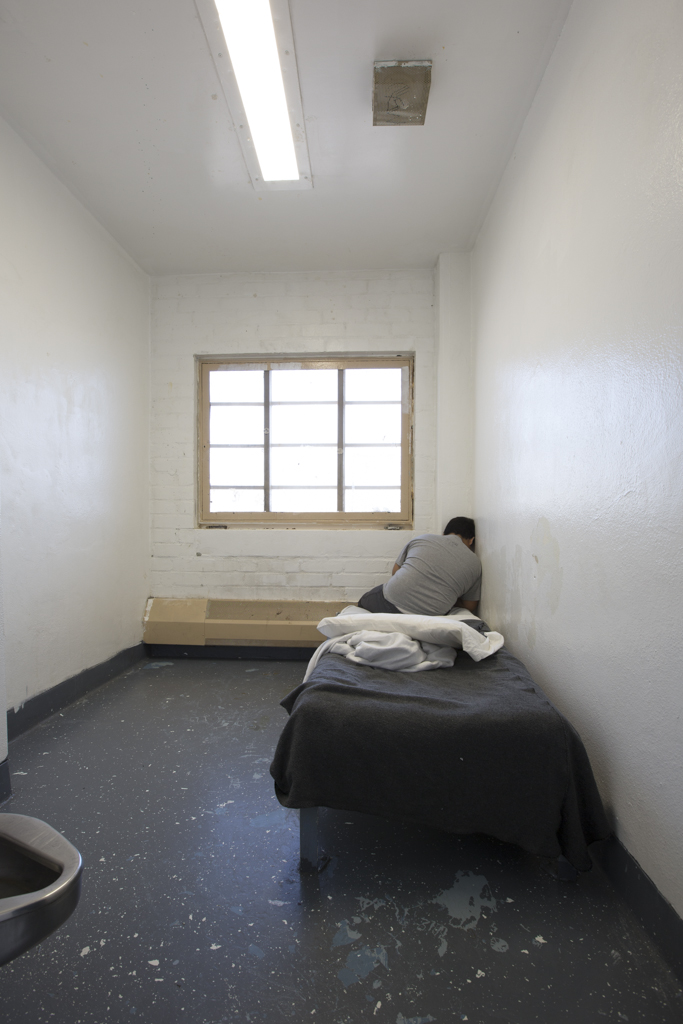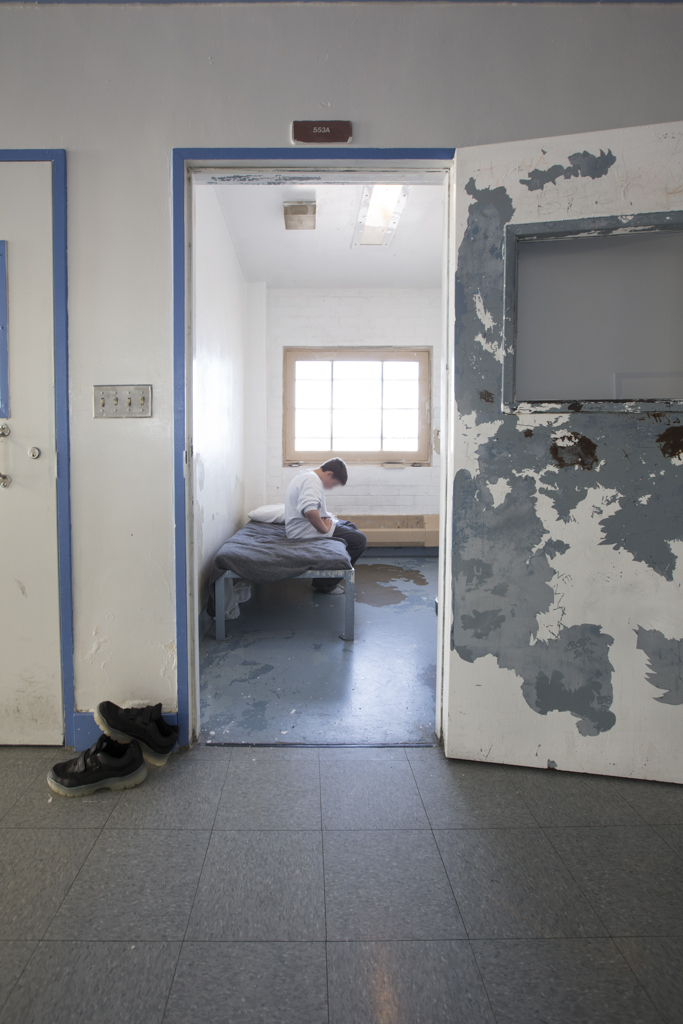Last month we received an email from Marquetta Harrison, from Kansas City, Missouri, wanting to tell her story. In July of 2010, her son Corey Webb, then age 16, was charged with aggravated assault against a public servant—a crime for which he was sentenced to 50 years. In emails with Marquetta, it is clear that her story reveals a state and a system that holds punishment by incarceration in the highest order.
 To give you an idea of the criminal system in Texas, here are some statistics accumulated by Robert Perkinson, a Soros Justice Fellowship recipient and author of Texas Tough: The Rise of America’s Prison Empire:
To give you an idea of the criminal system in Texas, here are some statistics accumulated by Robert Perkinson, a Soros Justice Fellowship recipient and author of Texas Tough: The Rise of America’s Prison Empire:
- Minimum number of Texas residents under criminal justice supervision: 740,905
- Total prison population (both violent and non) of the U.K., the most incarcerated country in Europe: 82,241
- Estimated percent chance in 1996 that a black man born in Texas will go to prison: 29%
- Approximate percentage of Texas’s overall population that is non-white: 40
- Approximate percentage of Texas’s prison population that is non-white: 70
- Rate at which blacks are incarcerated compared to whites in Texas: 7 to 1
- Rank of Texas in number of juveniles incarcerated in adult prisons: 1
- Rank of Texas in executing juveniles and mentally retarded inmates before recent Supreme Court prohibitions: 1
- Number of times the Supreme Court rebuked Texas’s highest court for defiantly ignoring its rulings in 2004: 3
Marquetta feels that Corey was poorly represented, detained for two years awaiting trial with little to no assistance from his court appointed attorney. Ultimately, she feels like her son gave up, and pleaded guilty. Corey’s mom writes, “I would love to wake from this nightmare, because it's unreal.”
Here are the basics of the story: According to Marquetta, when she got home from work she and Corey’s grandmother discovered that Corey had run away. Recently, his girlfriend had moved with her family to Tyler, Texas and Corey had run away to be with her. Guessing correctly that he would be headed to Tyler, 550 miles away, Marquetta called the Tyler police. Concerned and angry, she reported him as a runaway and to requested that the police detain Corey at the bus stop. When he arrived, they arrested him on runaway charges. After being alerted that her son was in custody, Marquetta was told that he would be held in detention there until local Kansas City Authorities could extradite him back home. Corey was taken to the Smith County Juvenile Attention Center in Tyler, Texas. Once inside, authorities stated that he pulled a gun from his backpack and allegedly shot at Juvenile probation officer Walker. Marquetta remembers receiving a phone call at 4AM the following day from a police officer telling her that her son “just shot up the detention center.” She recalls, “I sat straight up, and my heart went into my stomach. I just knew his next statement was that my child was dead. He then stated that [Corey] turned the gun on himself, and threatened to kill himself, and kept asking [the officers] to shoot him… I then asked, ‘How did he get a gun?’ The officer stated, ‘Out of his property.’ I said, ‘Excuse me? How did this happen? Where did he get a gun?’ He stated that the arresting officer never searched his property and turned his back to get something out of the closet. That’s when Corey pulled the weapon out of the bag.” According to Marquetta, the security tapes she was later shown were full of gaps where the incident had occurred.
Marquetta remembers the first time she was able to see Corey after he had been arrested:
Visitations were non-contact, and when I saw my child that I have only known 16 years, still with the look of innocence with an undisclosed amount of pain beyond his eyes, his arms filled with around fifteen staples where he had lacerations. I broke down in tears. I have worked in places like this, and reality came crashing down on me all at once. I never thought I would see my son in the bright orange jumpsuit. I spoke with my son, and he was so ignorant to the system. He stated, “When will they let me go home? Can't you get me out of here? I didn't do what they said, and I know you will help me!" We stared back at him with a poker face, and his father and I told him, “Yes, of course, we are going to help you,” but at the time deep down inside we couldn’t even reassure ourselves… He was like a small kid waiting for us to rescue him. The pain I was feeling in my heart of helplessness. It was a pain like I had never felt before. I have never been unable to hold my son, comfort my child, and discipline him on my own terms. I had just come to reality that all my power had just been giving to Smith County. I started to feel the guilt that I just handed my power over to them, and they had betrayed me.

When Walker, the probation officer who was allegedly shot at, was interviewed later he stated that he would like to have seen Corey get life in prison. There is a sad truth to be learned from his statement—some of those involved closely in the system, which see the same kids come in and out every month, feel that locking someone up for half a century is an effective and optimal reaction to his or her crime. Marquetta writes, “You could see this was not about punishment but about making an example out of him.”
Months after the incident Marquetta is still constantly questioning, where did he get the gun? Why didn’t they search his bag? What would make Corey do this? What was he thinking? To say that it is difficult for Marquetta to revisit the night of the incident is a vast understatement, a combination of emotions well up in Marquetta when she thinks about it. The guilt of getting the police involved in the first place, the fury at a system so impossible to navigate, and the incomprehension of his ultimate sentence. Throughout Marquetta’s recount of the incident and the months of legal dealings afterward there is an ongoing pattern of inconsistency ranging from trial dates being changed quickly without her notice to constantly changing visitation rules. Being 500 miles away did not make it any easier.
She writes, “I did my part as a parent, reported my son gone without my permission… My son did his part; he acted out as the irrational runaway adolescent hormonal teenager… The job was to apprehend the kid and diffuse the situation. It wasn’t diffused, and then it took a turn for the worse.” Corey was a child and made a bad decision, for which 50 years of his life are now owed.
Before July 2010, life in the Harrison home was different. Corey lived at home with his mom, grandmother, and two sisters. Marquetta describes Corey as “artistic, reserved and smart.” He enjoyed drawing, fooling around with his younger sister and playing video games. Corey was an honor roll student up to his Freshman year of high school, at which point he started to become distant and occasionally get in trouble. Shortly thereafter, his uncle and father were in a car accident, killing his uncle and severely injuring his father. Corey and his uncle were very close. After the accident, Corey became very distant and quiet. Marquetta remembers catching him crying to himself at times. She felt that the car accident “laid heavy on his heart” and that he had never fully recovered from the emotional trauma of it. He began to get in trouble at school and wouldn’t listen to Marquetta. She found out he had a girlfriend dealing with similar behavioral issues who wanted to have a baby by Corey. Marquetta didn’t want her son to be a father at age 16.
 Corey is serving out his sentence at the Allan B. Polunsky unit, a prison in Polk County Texas that also houses the Texas death row population. When we asked Marquetta what it is like to visit your child in prison she told us that it was very hard to step on Texas soil, let alone the prison itself. “To leave your child in a place that is known for rape, murder, and to house child molesters, and is over 500 miles away. It is devastating,” she states. When she visits, it isn’t like she is talking to the 16-year-old she knew before he was locked up. She says that Corey sounds her age, old beyond his years, and tries to soothe his mother and helps her find peace of mind. At home, her family “is walking around breathing, but we’re not living.” Corey’s father spends every day confined to his room, researching how to save his son. Marquetta feels like she has lost a part of her soul, an arm, a part of her brain and feels completely numb most of the day. She writes, “It’s so hard to go on daily and look at my two other children living life, and one being snatched away like a thief in the night. It’s very hard to deal with it, especially when you know you are working with a system that is very biased. Yeah, he made a big mistake, but not a 50-years-of-his-life mistake.” When Marquetta left for work that morning, Corey was helping his little sister unlock a new code for Super Mario Brothers, now when she talks to him he is “waiting for his next tray to eat, and watching that he doesn’t end up another raped victim in jail.”
Corey is serving out his sentence at the Allan B. Polunsky unit, a prison in Polk County Texas that also houses the Texas death row population. When we asked Marquetta what it is like to visit your child in prison she told us that it was very hard to step on Texas soil, let alone the prison itself. “To leave your child in a place that is known for rape, murder, and to house child molesters, and is over 500 miles away. It is devastating,” she states. When she visits, it isn’t like she is talking to the 16-year-old she knew before he was locked up. She says that Corey sounds her age, old beyond his years, and tries to soothe his mother and helps her find peace of mind. At home, her family “is walking around breathing, but we’re not living.” Corey’s father spends every day confined to his room, researching how to save his son. Marquetta feels like she has lost a part of her soul, an arm, a part of her brain and feels completely numb most of the day. She writes, “It’s so hard to go on daily and look at my two other children living life, and one being snatched away like a thief in the night. It’s very hard to deal with it, especially when you know you are working with a system that is very biased. Yeah, he made a big mistake, but not a 50-years-of-his-life mistake.” When Marquetta left for work that morning, Corey was helping his little sister unlock a new code for Super Mario Brothers, now when she talks to him he is “waiting for his next tray to eat, and watching that he doesn’t end up another raped victim in jail.”
-------------------------------------
If you are a family with a child in the system and you are seeking advice or assistance, please get in contact with Justice For Families, They can be reached via email at zachary AT justice4families DOT org or via phone at (510) 268 6941. Justice For Families is a national alliance of local organizations that can provide emotional and logistical support for court hearings, advocacy support to enable families to obtain the best services for their loved ones, and engage families in policy campaigns to change systemic failures in the juvenile justice system.








